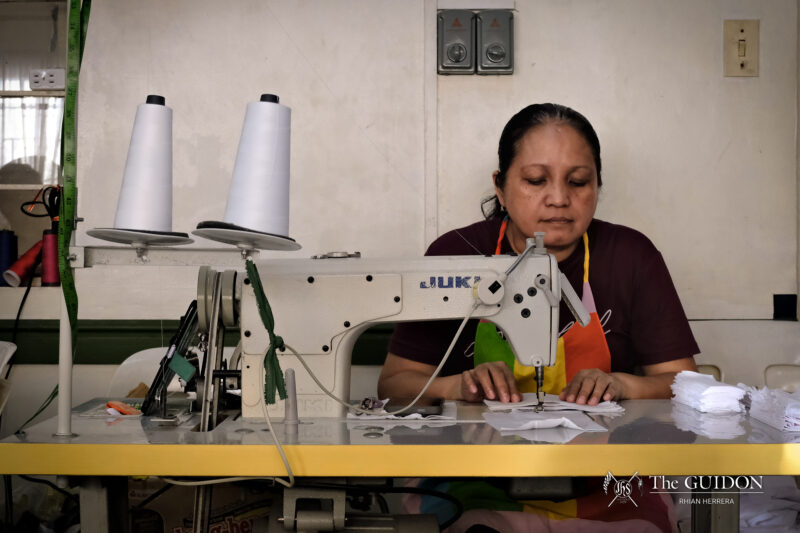On any given Sunday night, Ateneans are most likely to be lazily scrolling through Facebook. Posts selling a brand new pair of earphones or pre-loved gym clothes are inevitably bumped up on their feeds, and while most don’t give these a second glance, a few will pause to consider purchasing them. One second too long, however, and it will be too late—“Sold!”
Such is a typical scene on Ateneo Trade, the rapidly growing Facebook group that serves as an exclusive marketplace for Ateneans looking to buy and sell everything from second-hand textbooks and baked goods, to puppies and the occasional BMW. Because of the way it is slowly changing how both individual students and entire organizations conduct business, this student-run group seems to be more than just a passing social media fad.
Modern marketplace
Communications technology management senior John Natividad recalls how in 2012, his older brother, Rey, was already trying to think of a way to help Ateneans find cheaper books and physical education (PE) supplies. Then a senior member of the Department of Student Welfare and Services (DSWS), his brother was able to successfully implement the project through the DSWS website. Still, this was not without its challenges, especially since DSWS was often undermanned. “We realized that it was such a hassle,” Natividad explains in a mix of English and Filipino. “You have to accept objects, file them, issue contracts and receipts, then sell them and return part of the proceeds to the owner.”
After realizing that the transactions would run more smoothly if there was no middleman involved, the two went about creating a Facebook group that was self-moderated, similar to local classified-ads websites like AyosDito and Sulit.PH. In a mix of English and Filipino, Natividad says, “[Back then], there were no regulations at all. You could post anything in the group, even if you weren’t selling. [There were no administrators because] we didn’t want anyone babysitting the group.”
A few things have changed since then. For instance, in the beginning, most people would only visit Ateneo Trade during the start of each semester to look for textbooks, but nowadays, the group is constantly buzzing with activity. “As an admin, the first thing you will notice is the flood of notifications! Every post, every comment, every like, you receive a notification,” Natividad complains.
He credits Jace Monje, a management information systems junior and one of 10 administrators, for helping create systems. “Back then, I just wanted to follow what the founders wanted,” Monje recalls, who, in his freshman year, volunteered as an administrator after noticing how undermanned Ateneo Trade was. However, with 10,103 members and counting, rules requiring prices to be clearly stated, limiting bumps per day and banning the promotional material of school organizations became necessary; these were implemented in December 2014 to maintain order within the group. Details regarding the condition and usage of the items for sale and acronyms like “LF” (looking for) and “RFS” (reason for sale) also make information on the group easily digestible.
All in a day’s work
“So far, I haven’t gotten any reports of transactions gone wrong, or stolen or false items,” Monje says in a mix of English and Filipino. “But that’s not to say that those things aren’t happening. I wouldn’t be surprised if there have been a couple of incidents.”
For Jellie Sim, a frequent patron of Ateneo Trade and co-owner of Just Mix, a start-up business under the School of Management Business Accelerator Program, the new rules have resolved most of the problems she once had with the group. Still, some issues remain. According to Sim, “Sometimes, people really extort other people [when they make] selling prices much higher than the product’s worth. I don’t think the [administrators] can do much. [It depends on] the individual.”
Dealing with ticket scalpers is another gray area for the Ateneo Trade administrators. Surprisingly, according to a 2014 article in The Philippine Star, there is no national law prohibiting the mass purchase and resell of tickets at more expensive prices. While Quezon City did pass an anti-scalping ordinance in 1985, it is severely outdated as it penalizes scalping only for P10 to P50. Monje admits, “It’s difficult to enforce rules against scalping. In Ateneo, if someone’s willing to pay P13,000 for Sam Smith tickets, it’s their money.”
The administrators also have to deal with nuisance transactions or “calls for attention.” Monje remembers how a girl selling one sheet of A4 paper irritated many Ateneo Trade members because her post kept getting bumped over those of serious sellers. People placing exotic animals up for sale also tend to cause a stir, but in such instances, the administrators allow the forces of supply and demand to play out. “If [they can’t resolve the problem on their own], we step in and mediate in such a way that is neutral to all parties, in accordance with what’s legal and fair,” shares Monje.
Given the generally hands-off attitude of the administrators regarding most issues that arise in the group, one might wonder as to what they do on a daily basis. The approval of members is one such task: The administrators check the Facebook profiles and mutual friends of those who are requesting access then decline the non-Ateneans. “It’s weird looking at the requests to join the group and some of the people aren’t even from the Philippines,” jokes Benjam Limjap, a management sophomore who is also an Ateneo Trade administrator. “How did you even find this?”
Better business
Because the group is exclusive to Ateneans, a safer environment for business is created. “There’s a certain level of trust between you and your fellow Atenean,” Sim reasons, who no longer fears making bank deposits to unknown accounts.
Armando Miclat, Jr., a part-time faculty member at the John Gokongwei School of Management, has a similar view. “[Filipinos are] always looking for connections… It’s much easier to transact business if you know somebody,” he says, adding that Ateneo Trade fulfills the Filipino desire for closeness.
School organizations, recognizing the potential of Ateneo Trade as a lucrative point of sale, have been using the group for fundraisers lately. For Monje, selling food or tickets is not a problem for as long as the posts don’t repeat and clutter the group. This development means that the organizations no longer have to rely solely on people walking around campus and selling baked goods or tickets to raise money.
Ateneo Trade can also be a valuable resource for start-up business owners, many of whom consider bazaar rental fees as one of their bigger expenses. According to Natividad, “I personally know a couple of people who sell lasagnas and crinkles and are very happy about the group existing.” Still, it might not be for everyone just yet, as others, like Sim, don’t see Ateneo Trade as fitting into a long-term sales strategy.
Aside from changing people’s perceptions, the administrators will also have to consider moving to a new platform. Several students have already approached the administrators with ideas for an Ateneo Trade website, but Monje is hesitant because Facebook is still the most convenient means for everyone involved.
Sustainability is another concern, which is why students from different year levels are currently being trained to take over the group once the seniors graduate. Additionally, “[there is] stuff we haven’t made rules for yet,” says Limjap, referring to a recent auction that took place in the group. But necessity being the mother of invention, Ateneo Trade will surely find a way to adapt.







